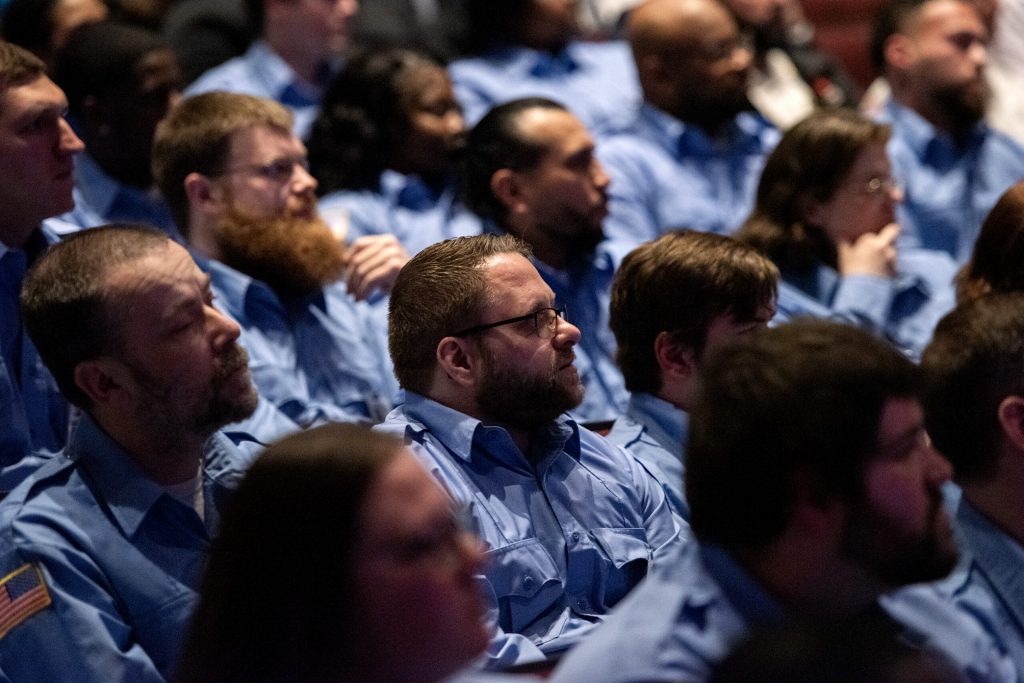WI Supreme Court Okays Corrections Officers’ Class Action Suit Over Pay
5-2 decision backs workers in wage case against state Department of Corrections.

Corrections officer graduates sit during their ceremony Wednesday, Feb. 21, 2024, at Madison Area Technical College in Madison, Wis. Angela Major/WPR
The Wisconsin Supreme Court says state corrections officers should be granted class action status as they continue to pursue a lawsuit over pay.
A group of officers sued Wisconsin’s Department of Corrections in 2020, saying they should be compensated for mandatory tasks that take place before and after their shifts officially start. That includes going through security, putting on and taking off equipment, and briefing incoming officers during shift turnovers.
The Supreme Court decision released Tuesday does not determine whether workers should or should not get paid for their pre- and post-shift duties. The workers had asked for damages, including regular and overtime pay.
But the high court decision does allow corrections officers to sue as a group in lower court. Tuesday’s ruling reverses an earlier appeals court decision, which denied class action status to the workers.
In court documents, Wisconsin’s Department of Corrections argued workers would be better served by pursuing individual wage claims instead of a class action lawsuit. That’s in part because of the differences between the thousands of corrections officers who work at 37 prisons across the state.
During oral arguments in March, attorneys for the state noted that one corrections officer said he could be at his post within a minute, while another said it can take her half an hour to get her assigned position within a sprawling prison.
Attorneys for the workers, however, argued there are strong similarities among all corrections officers. The proposed class could include about 5,000 corrections officers and sergeants, attorneys for the workers said.
Those similarities include the need for employees to respond to an emergency, even if it happens before a shift officially starts.
“This what I call the vigilance argument,” Tim Burns, an attorney for the employees, said during oral arguments. “Because it’s a prison from the time you enter the security envelope until the time you leave.”
Five of the court’s seven justices were ultimately persuaded by those arguments in favor of class action status. The majority decision upholds an earlier ruling by the Milwaukee County Circuit Court, which granted class action status to the workers.
“The circuit court’s decision reflects that this case—which involves state-wide policy affecting thousands of employees—can be fairly and efficiently resolved in a class action,” the decision written by Justice Janet Protasiewicz said. “The circuit court did not erroneously exercise its discretion in certifying the class, and any decision on the merits is for another day.”
Joining the 5-2 opinion were the rest of the court’s liberals and conservative Justice Brian Hagedorn.
Justices Rebecca Bradley and Annette Ziegler, both conservatives, partially dissented from the majority opinion, saying it dealt with issues that should have been handled by a lower court.
A Department of Corrections spokesperson said the agency is still reviewing Tuesday’s decision.
Meanwhile, lawyers appointed to represent the workers said they’re looking forward to litigating the case through a trial.
“Corrections officers are the largest officer force in the State of Wisconsin and do a vital and incredibly difficult job,” said a statement from the firms of Cuneo Gilbert and LaDuca, DiCello Levitt and Burger Law. “It is simply unfair that, for years, Wisconsin has forced them to do unpaid work before and after their shifts.”
Corrections officers can pursue class action suit over pay, Wisconsin Supreme Court rules was originally published by Wisconsin Public Radio.
If you think stories like this are important, become a member of Urban Milwaukee and help support real, independent journalism. Plus you get some cool added benefits.





















